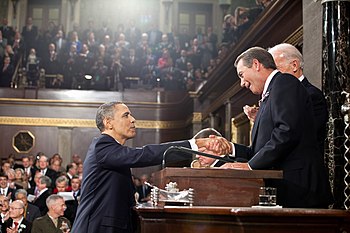Dear America,

English: Forstner drill Deutsch: Forstnerbohrer (Photo credit: Wikipedia)
My son is a little ham-handed. Like most vigorous men of twenty-four, he still thinks that force is the best way to address most problems. So, while we were working on the brakes of my old car, he twisted the bleed valve off leaving the threads in the hole, but little else to grab on to. So, I went to Sears to get something to reverse the threads out of the hole, but it is something like a reverse threaded drill bit and it didn't come with a handle. I thought I could use pliers, but I couldn't gain sufficient purchase on the little drill bit, so I went to Lowe's to find one. They don't carry them, even though for this purpose and for tapping and threading new threaded holes you need one. Lowe's is a hardware store, and this thing I needed is not only hardware, it is something that is commonly used...needed and used. My first problem at Lowe's was finding someone to help me, and my second was that they didn't have something that every hardware store should have. Mind you, the only reason I went to Lowe's was an experience I had had about two weeks ago at Home Depot just across the street.
On that occasion I found what I was looking for, but before I did, I passed a conclave of one customer and three "associates"--they used to be clerks--in a huddle, the customer talking to the person who had sent him. He was saying that the people at Home Depot didn't seem to have what he had been sent for: a Forstner bit. Since I was near the tool department, I went over and got one, and then brought it back to the scum of Forstner seekers to present it to the customer. "This is a Forstner bit," I said. "They're located with the other drill bits in the tool section," at which point the three associates scowled at me as if to say that I should have minded my own business, which brings me to my point.
We live in an age in America in which jobs are not easy to come by. And there are people with basic skills...like carpentry and auto mechanics...begging for work. Any unemployed carpenter would have known what a Forstner bit was, just as any unemployed auto mechanic would have known what to look for when I asked for the handle one uses to rethread a bolt hole, but neither Sears nor Lowe's had such a mechanic, and Home Depot didn't have a carpenter either. All three have CEO's however, and those guys make millions on the premise that they can lead their corporations out of the corporate malaise that at least Sears has been suffering from for the past decade or more, but they pay the people who have to lead customers to the Forstner bits ten bucks an hour, which explains why they can't hire the out of work carpenters and mechanics. As to Home Depot, it is profitable now, but it wasn't long ago that it fired its CEO because he wasn't performing...paying him off with a small fortune just to get him out of the corner office. And Sears, under the guidance of its CEO, bought K-Mart out of desperation, which desperation has continued and has now put Sears on the verge of Chapter 11 bankruptcy. And I'm willing to bet that not one of those company's CEO's knows what a Frostner bit is, but it hasn't occurred to any of them apparently that the reason that their stores fail is not that they didn't take the right courses at Wharton. It is because they don't know what a Forstner bit is...and more importantly, they don't know to ask their future employees...their future associates, I mean...if they know what a Forstner bit is.
What I'm saying is that corporate America, which invests $12 dollars for robots for every $1 it spends on new hires, is running amok while putting fortunes into the pockets of those who own the capital in this country, prominent among them all those CEO's who get paid even though they don't know the businesses they run. When Home Depot's board of directors began interviewing candidates to take over from their last disastrous choice, I'm willing to bet that they didn't ask the candidates whether they knew about Forstner bits, nor did they ask anything else about the business they were running. They looked at the resumes and made their choice, and among those resumes were the resumes of other former CEO's who had failed at their last jobs, or who had succeeded often because they just happened to be at the right place at the right time, but the rest of us don't have a monopoly on stupidity. There are stupid carpenters and auto mechanics, but there are stupid lawyers--I know; I met plenty of them while I was practicing--and doctors, and as it happens, CEO's. Maybe you have heard Jack Welch speak. He sounds like a moron, and despite the fact that somehow he has entered into the pantheon of former CEO's who are regarded as sages for the present ones, he did plenty of stupid things when he was running GE. In fact, the last thing he did there was spend $100 million on an attempt to take over Honeywell, which attempt failed because, as the European regulators of these things pointed out, such a merger would be monopolistic. Apparently Welch thought he was smarter than they were because GE rose 4000% in value during his twenty year tenure there, but in reality, it was all those people at GE who know what a Forstner bit is that caused GE to prosper...along with some dubious practices for which the company was sanctioned at components of the company like GE Capital. But when he retired, he took plenty of that growth with him, some of it in the form of a million dollar condominium in Manhattan, over which there was such a hue and cry among shareholders that he had to give it back, maybe because he continues to say stupid things while taking credit for being their former CEO. About the time that President Obama was reelected, unemployment took a dip while job creation wasn't anything spectacular. Welch "tweeted" something to the effect that Obama and his people would "stoop to anything" to stay in office, insinuating that the administration had cooked the books on the unemployment figure. But the figure was never challenged, and as it continued to go down, it became apparent that it was genuine...even to Welch I guess, because outside of his interviews on Fox News, nobody ever spoke to him about his unfounded, no, preposterous suspicions again.
All of this suggests to me that the problem with the American economy is at the top, not the bottom. If the people who knew how to do the work ran the companies that do the work, we would all be a lot better off. And by extension, if the companies that sell Forstner bits were run by people who knew what Forstner bits were...
Your friend,
Mike









